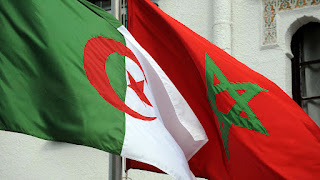Cold War Between Algeria and Morocco
By Naveed Qazi | Editor, Globe Upfront
It was in December 2020 when Donald Trump ended US neutrality in Western Sahara Conflict. Trump had announced Morocco’s sovereignty over every inch of the Western Sahara territory in exchange for Rabat entering the Abraham Accords. It made Morocco the fourth Arab country to normalise relations with Israel in 2020.
Trump’s decision violated international law, and the UN’s peacekeeping efforts to end the conflict. But, all of this has been traumatic for Algeria. It has led many Algerians angry and extremely worried about national security, as they think Rabat may become militarily superior to Algiers in the future, due to enhanced cooperation between the United States and Morocco.
As Biden has not reversed Trump’s decision, it has led to a new cold war between Algeria and Morocco. That’s why Algeria severed ties with Morocco in August 2021. While the step undertaken by Algeria may not reflect the same severity of 1994, when Algeria closed its land border with Morocco, following the latter’s decision to impose visas on Algerian nationals, due to an extremist attack, it appears to be the final nail in the coffin for hopes of a unified Maghreb, and in the revival of the long-defunct Arab Maghreb Union.
Before 1994, there were broken relations between the two countries as well. The rifts between the neighbours, actually span back all the way back to the Sand War in 1963. Then, in 1976, Morocco severed ties following Algeria’s recognition of the Sahrawi Arab Democratic Republic (SADR). Relations were then restored in 1988.
There were other factors that came into play in their deteriorating relations since 2021. One of them was Morocco’s sponsoring of the Movement for Self-determination of Kabylie (MAK), a separatist group inside Algeria, which was also responsible for deadly forest fires in the country in 2021.
Some commentators argue that Algeria is simply focusing on Israel/Palestine, and the Western Sahara conflict to distract its citizens from domestic challenges. But, it has some genuine and practical reasons for opposing normalisation with Israel. In fact, there is an actual risk of Israeli submarines floating around or near Algerian territorial waters. The Israelis, on the other hand, accuse Algeria, without providing any evidence, of working closely with Iran to engage in deleterious activities in the area.
As per an article in Middle East Institute by Zine Labidine Ghebouli: ‘Both at the official and popular levels, Algerians are exploring the limits of their relationship with the Moroccans, and this is part of a broader national process of reshaping Algeria’s political system and society. This is a process that will determine the future, and limits of cooperation in North Africa. While the pursuit of regional supremacy is concerning, this competition does not necessarily have to lead to open conflict.’
However, since Morocco joined the Abraham Accords, there has been a steady deterioration on the ground in Western Sahara. Today, violence is re-escalating in Western Sahara with the Moroccan military attacking Polisario (Sahrawi) positions. It has made many observers of the Maghreb concerned about a new all-out war erupting between the North African kingdom and the Algerian-sponsored Sahrawi separatist group.
After twenty-five years, the Maghreb Europe Gas pipeline (GME) also has had its operations suspended, due to the growing political tussle. Algiers will now deliver its natural gas to Spain exclusively through an undersea pipeline to avoid going through Morocco.
There is also a certain international isolation for Algeria. Among the most powerful Western powers, there’s absolutely no sympathy for Algeria’s position.
Turkey, Egypt, and the GCC states, meanwhile, are on Rabat’s side, highlighted by the sale of Turkish drones to Rabat and numerous Arab states opening, or planning to open, consulates in Western Sahara.
It is only Russia, which gives Algeria some political sympathy. Moscow sells weapons to Algeria in large quantities. But, Putin will certainly take a side with Morocco, in relation to Western Sahara, thereby not harming its relations with Morocco.
China, which recently sold Algeria drones, might be the power most likely to conduct diplomacy in North Africa in ways that are favourable to Algerian interests and positions. But, like Russia, China has a growing economic partnership with Morocco, which is valuable to Beijing for investment, trade, and other key reasons, giving Algeria more geo-political headaches.
The most surprising fact in this cold war emerged when press stories were out where Rabat was accused of using Israeli Pegasus spyware, targeting over six thousand phones of Algerian politicians, soldiers, members of intelligence services, senior officials, diplomats and political activists.
The recent escalations between Algeria and Morocco are only diplomatic, and they haven’t harmed economic relations. At the same time, economic fallout between the two nations won’t impact global trade, as intra-Maghreb trade relations barely exceed four per cent of global trade.




Comments
Post a Comment
Advice from the Editor: Please refrain from slander, defamation or any kind of libel in the comments section.